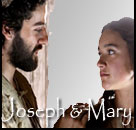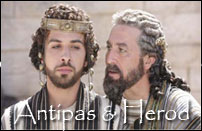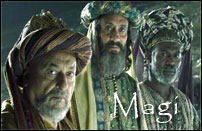Woman taken in adultery's letter to her ex-lover
Saturday, December 30, 2006Simeon, I thought you were my friend, my hope, my love. How could I have been so blind?
I must tell you the rest of what has happened. It was terrifying, and yet wonderful! Shall I tell it all? The beginning, of course, you know, until when we were caught and you somehow managed  to escape—right through their hands it seems! How you did it, I could not imagine, at least not then. Our whole affair had been too fast, too soon, too rushed, for it to be real. My hurting heart wanted to believe, but now I think I understand.
to escape—right through their hands it seems! How you did it, I could not imagine, at least not then. Our whole affair had been too fast, too soon, too rushed, for it to be real. My hurting heart wanted to believe, but now I think I understand.
You abandoned me in bed, uncovered, exposed to them when they rushed in, just after you rushed out. They looked on me with accusing eyes; I saw lustful looks among the poisonous righteous. They refused to let me dress myself, rejected my pleadings for even a robe to thinly disguise my shame. But for the sheet itself, I would have been dragged through Jerusalem with body as bare as my soul.
Where did you put on your tunic, Simeon? Did someone have clothes ready for you around the corner from my house? They appeared to be clean and fresh when I saw you standing with the others before the Teacher. You had even combed your hair and arranged your beard. Yes, I saw you. Did you see me? I could not tell: your eyes never met mine in the circle around the Teacher.
Most of the eternity that I stood before him, clutching the sheet against my chest, I could look at no one. I could only examine the stones—jagged and threatening, clutched in nervous hands—and at the dust swirling around the feet of the mob and the Master. I could not look at him either, could not, that is, until he stooped down, intruding himself into my field of vision. He glanced at me, looked down, and when his gaze returned, he did not look away.
"Well, teacher?" the rabbi demanded. "Moses said she should be stoned, but what do you say?"
I held my breath, listening to my wildly beating heart, wondering how many beats it had left before the end. I waited for him to give them his assent, a gesture, a nod of the head that would be my death warrant. He did not. He only wrote upon the ground with his finger.
The leaders of the crowd pressed him. "Have you nothing to say? Is Moses to be obeyed or not?" The two who held my arms tightened their grip.
Once more the Teacher looked up, first at me, with a tenderness I shall never forget. Then, as his eyes drifted from me to them, that tenderness evaporated in the hot fury that followed. "Let the guiltless be the first to cast a stone at her," he announced. And then the fury subsided as the eyes fell once more to the finger that wrote upon the ground.
I thought at first he was doodling there in the sand at our feet. But then I could see what he wrote. His finger traced the Hebrew letters from first to last: aleph, beth, gimmel, dalet, and the rest, one by one. He had gone about halfway through the alphabet before I realized what was happening: when he traced the initial letter of each man's name, I heard the thud of that man's stone as it dropped from his fingers and hit the ground. One by one, the stones began to fall, and man by man, they all turned and skulked away.
When he got to your letter, the "sin," Simeon, you too dropped your stone and walked away. By the last letter, everyone was gone.
With one sweep of his hand, the Master scattered the alphabet he had written and looked up. "Madam," he asked, "is no one left to bear witness against you?"
"No, sir," I replied. "There is no one." We were quite alone.
That's when he looked at me with those eyes that pierced me and could see me as I really was, heart-sick and lonely, vulnerable to a man like you, Simeon, a man who showed a sudden interest and had a beguiling smile. Those eyes, my heart told me, bore witness to my sin—our sin—and attested to my guilt. I realized with a chilling terror that he himself might provide the condemning testimony. And yet, those same eyes that perceived with such incredible ease my sordid past also gazed at my future, and there they must have seen something quite different.
"Neither will I condemn you," he said with his slow smile. "You are free to go, only... leave your sin behind you."
O Simeon, whom I trusted with my life, my soul! How could you have done this wicked thing? You lured me to my husband's bed. How much did they pay you to entrap me like that? The Master—I know he knows. You cannot hide from his probing, piercing eyes. You are guilty, as guilty as I was. More guilty now, for I have been forgiven.
You entrapped me that you all might entrap him, but both of us are free—he and I—while the trap closes its jaws on you and on them. I can only say to you what he said to me: "Leave your sin behind you." You have dropped the stone from your fingers, but there is a stone where your heart ought to be. That stone is harder to let go of.
I will pray for you, Simeon, now that I am restored. I still love you, though my heart remains deeply wounded because of what you did. I can never talk to you or see you again while you remain stone-hearted. I pray that God can replace that cold stone with a warm heart of flesh, as the prophet Ezekiel promised.
The Teacher is now my Master. That you could wish him dead astonishes me more than that you could wish me dead. How different He is from you! You looked at my body and lusted. He looked at my soul and loved. You wanted me dead. His burning desire was for me to find life, not just escape from my execution, but the full, blessed life He offers to everyone. And to those who accept His offer, He delivers that life.
I wish you life, Simeon. You don't deserve it, but then, neither did I.
You have my love, now more than ever, yet also my pity.
Alexandra
Want to go deeper?
- What did Jesus write in the dirt?
- Hearts of stone or flesh?
- Concerning the textual problem
Alexandra's letter is only one suggestion among many. Some say Jesus only doodled in the dirt. Others say he wrote the sins of the accusers, while others suggest he wrote the names of those involved in the entrapment. Since the text doesn't say, there is no way for us to know for sure.
Read the amazing and wonderful prophecy of Ezekiel about spiritual heart surgery in Ezekiel 36:24-28.
The earliest and most important manuscripts (including, among many others, the Bodmer papyri and codices Sinaiticus, Vaticanus, Alexandrinus, and Ephaemi Rescriptus) omit the passage that contains the story of the woman taken in adultery (John 7:53-8:11). Of those that have it, the earliest (Codex Bezae) dates to around the middle of the sixth century.
Even when the section occurs in its traditional place, manuscripts often feature asterisks or other marks indicating that its authenticity was regarded as doubtful. This does not mean, however, that it is a later scribal addition, for Eusebius says the incident is mentioned by Papias, whose work was adapted at about 130 CE.
Other manuscripts omit it in its traditional location but have it at the end of John's Gospel, while in others (notably Family 13), it occurs at the end of Luke 21. This placement in Luke is intriguing, for the passage fits the context, style, vocabulary, and theological interests of the Gospel of Luke better than the Fourth Gospel, and its original placement there is perhaps more likely than its tradition position between John 7:52 and 8:12, where it seems to interrupt the flow of the context.
Regardless of where it should be placed, many scholars have endorsed its historical authenticity. Both the content of the teaching and the action of Jesus are in complete harmony with other like incidents and situations in His life.
Sources:
Eusebius, Ecclesiastical History 3.39.17 (Kirsopp Lake and J. E. L. Oulton, trans. and eds., 2 vols., Cambridge, MA: Harvard University, 1926 and 1932): 1:298-299.
McMillan, Earle. "Textual Authority for John 7:53-8:11." Restoration Quarterly 3, 1 (1959):18-22.
Metzger, Bruce M. A Textual Commentary on the Greek New Testament. New York: United Bible Societies, 1971. 219-223.
Salvoni, Fausto. "Textual Authority for John 7:53-8:11." Restoration Quarterly 4, 1 (1960):11-15.
Steve Singleton, DeeperStudy.com
 The Nativity Story is the new cinematic presentation of the events surrounding the birth of Jesus by director Catherine Hardwicke. One scene serves to summarize the overall theme of the movie. Ruth, one of Mary's Nazareth neighbors, tells the village children the story of Elijah's encounter with God as recorded in 1 Kings 19:1-13. God was not in the wind, the earthquake, or the fire, but He spoke to Elijah in "a still small voice."
The Nativity Story is the new cinematic presentation of the events surrounding the birth of Jesus by director Catherine Hardwicke. One scene serves to summarize the overall theme of the movie. Ruth, one of Mary's Nazareth neighbors, tells the village children the story of Elijah's encounter with God as recorded in 1 Kings 19:1-13. God was not in the wind, the earthquake, or the fire, but He spoke to Elijah in "a still small voice." The movie also moves us to think about the price Mary and her spouse-to-be Joseph had to pay to serve as mother and foster father of Jesus. The estrangement from their former friends and undercurrent of gossip portrayed in the film nevertheless probably understates the humiliation of their circumstances. Not only was Jesus born to a working-class family; many must have assumed he was an illegitimate "child of fornication."
The movie also moves us to think about the price Mary and her spouse-to-be Joseph had to pay to serve as mother and foster father of Jesus. The estrangement from their former friends and undercurrent of gossip portrayed in the film nevertheless probably understates the humiliation of their circumstances. Not only was Jesus born to a working-class family; many must have assumed he was an illegitimate "child of fornication." he plots to thwart the messianic prophecies by killing the predicted Messiah as soon as he appears. Herod does this in consultation with his son Antipas, intimidating and threatening the young man. Having such a father explains his conduct 30 years later when Herod Antipas executes John the Baptizer and mocks Jesus during His trial.
he plots to thwart the messianic prophecies by killing the predicted Messiah as soon as he appears. Herod does this in consultation with his son Antipas, intimidating and threatening the young man. Having such a father explains his conduct 30 years later when Herod Antipas executes John the Baptizer and mocks Jesus during His trial. Magi, portrayed along traditional lines that include their number (three), their names (Gaspar, Melchior, and Balthasar), and their races (one is African). Not one of these things is attested by the gospel accounts. Another deviation from the biblical text is their decision not to report to King Herod, uninformed by a heaven-sent dream as in Matthew 2:12.
Magi, portrayed along traditional lines that include their number (three), their names (Gaspar, Melchior, and Balthasar), and their races (one is African). Not one of these things is attested by the gospel accounts. Another deviation from the biblical text is their decision not to report to King Herod, uninformed by a heaven-sent dream as in Matthew 2:12.